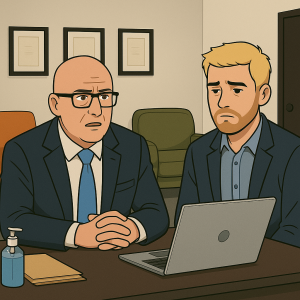1. Victim and Witness Rights
- Criminal Justice Coordinating Council (CJCC) – Victim Assistance
Oversees statewide victim services, including compensation, emergency relocation, and legal support after a crime. - Georgia Office of the Attorney General – Crime Victims Compensation Program
Offers financial assistance to eligible victims for medical, counseling, and loss-related expenses.
2. Free and Low-Cost Legal Aid Programs
- Georgia Legal Aid
Provides resources, referrals, and direct legal services for civil matters including protective orders and harassment. - Atlanta Legal Aid Society
Offers free legal help in the metro Atlanta area, especially for domestic violence, stalking, and online abuse cases.
3. Relevant Laws
- Stalking: O.C.G.A. § 16-5-90
What it means: Knowingly and repeatedly following or contacting someone in a way that causes emotional distress and fear for safety. Includes cyberstalking. - Harassment: No general criminal statute; addressed under stalking and threats laws.
What it means: Georgia law addresses harassment under stalking statutes and certain electronic communications laws. Threats may be charged under terroristic threats (O.C.G.A. § 16-11-37). - Bullying: No adult criminal statute. Covered under O.C.G.A. § 20-2-751.4 (Education Code).
What it means: Georgia requires schools to have anti-bullying policies and procedures for discipline. Includes bullying, cyberbullying, and intimidation between students. - Defamation: Civil tort, not criminal. Based on Georgia common law and O.C.G.A. § 51-5-1 through § 51-5-12.
What it means: Victims may file lawsuits for libel (written) or slander (spoken) if false statements harmed their reputation. Georgia does not criminalize defamation.
4. Reporting and Hotlines
- Dial 911 if you are in immediate danger or facing threats.
- Report non-emergency issues to your local police department or sheriff’s office.
- Georgia Coalition Against Domestic Violence (GCADV)
Offers legal advocacy, shelter referrals, and confidential crisis support throughout the state. - Statewide Domestic Violence Hotline: 1-800-334-5065
Available 24/7 for help, shelter access, and advocacy referrals in Georgia.
5. Support Organizations
- Georgia Coalition Against Domestic Violence
Supports victims with legal aid coordination, housing resources, and outreach services. - Partnership Against Domestic Violence (PADV)
Offers shelter, legal help, safety planning, and youth prevention programs in metro Atlanta.
6. Civil Remedies and Protection Orders
Georgia courts offer Temporary Protective Orders (TPOs) for stalking, harassment, and family violence. Victims can file through local Superior Courts with or without an attorney. Legal aid offices can help prepare forms and represent petitioners.
Important Note on Jurisdiction: If the individual you are seeking a restraining order against lives in a different state, your local court may not have jurisdiction to enforce that order. In most cases, you must file for protection in the state where that individual resides or where the conduct occurred. This applies even in situations involving online harassment, defamation, or stalking. Contact legal aid services in both your state and the other person’s state for guidance.
7. Youth and School Resources
- Georgia Department of Education – Bullying Prevention
Includes reporting tools, state-mandated school policies, and district complaint procedures.
8. Court Forms and Filing Help
- Georgia Legal Aid – Stalking Protective Order Guide
Offers instructions, forms, and step-by-step filing tips for protection orders.
9. Online Safety and Privacy Tools
- NNEDV Tech Safety Toolkit
Offers support and safety strategies for dealing with cyberstalking, digital threats, and online defamation.
Disclaimer: This information is provided for educational purposes only and does not constitute legal advice.




